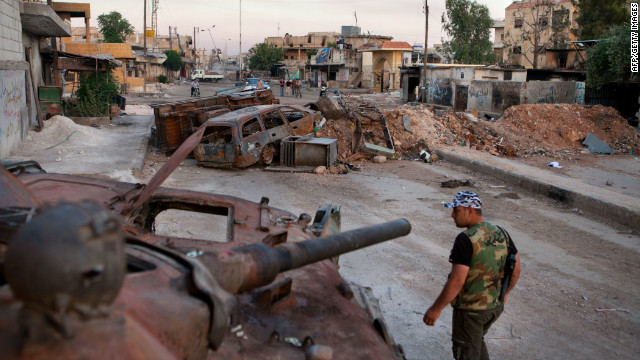
- Special Envoy Kofi Annan is in Damascus
- It is unclear if Annan will present a U.N.-backed plan that calls for government transition
- President Bashar Al-Assad has said there is no need for such a peace plan
- The Syrian military is holding exercises that simulated defense from an invasion
(CNN) -- Former U.N. Secretary-General Kofi Annan was in Syria for talks Monday with embattled President Bashar al-Assad, the first meeting between the two since the collapse of a peace plan to end nearly 16 months of bloodshed that has left thousands dead.
The news of the talks came as state-run media reported that Syria's military began conducting live-fire training exercises that simulate a defense against foreign attacks, while al-Assad's regime and the opposition traded new allegations of violence.
Annan, the United Nations and Arab League joint special envoy to Syria, arrived in Damascus on Sunday ahead of the one-day talks, said his spokesman, Ahmad Fawzi.
The spokesman did not release details of the talks, though they follow a recent admission by Annan that a six-point peace plan that he brokered in March had collapsed. The plan called for an immediate end to the violence by al-Assad's forces and rebels, access to humanitarian groups and an inclusive political dialogue.
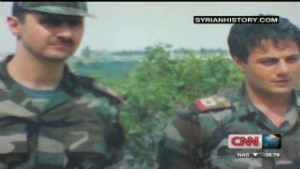 Top Syrian general defected to Turkey
Top Syrian general defected to Turkey 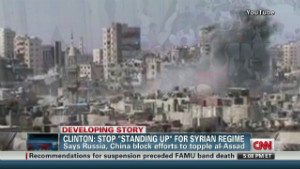 Clinton talks tough on Russia, China
Clinton talks tough on Russia, China 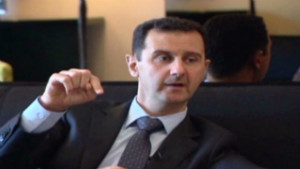 War of words out of Syria
War of words out of Syria 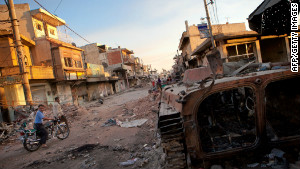 Rights group: Thousands killed in Syria
Rights group: Thousands killed in Syria The talks also follow an emergency meeting that Annan called last month of foreign ministers who agreed for the need for a transitional government body as a step toward ending the Syrian crisis.
Under Annan's latest proposal, which was approved June 30 by the U.N. Security Council and the Arab League, al-Assad's government and the armed opposition would appoint representatives to negotiate the makeup of the transitional government.
A key condition of a peace plan, Annan has repeatedly said, is an immediate end to the violence that erupted in March 2011 following a brutal crackdown on anti-government demonstrations that spawned an armed uprising.
The plan allows for al-Assad's regime to have a role in the transition, though the opposition and some Western and Arab nations are against.
There is no indication that al-Assad, who has been under enormous international pressure to end the violence, will even consider stepping aside.
He has repeatedly blamed the uprising on home-grown terrorists and foreign fighters bent on destabilizing Syria.
Asked in an interview that aired Sunday about Annan's plan for a unity government in Syria, al-Assad said one already exists, pointing to local elections in December in which opposition members won a small number of seats. That they didn't win more, he told German broadcaster ARD, was down to the voters.
Al-Assad said he has a two-pronged solution to ending the fighting, beginning with combating the terrorists.
"The other axis is to make dialogue with the different political components, and at the same time, we have reform," he said.
Asked whether this reform should be sped up, al-Assad said a timetable would be subjective. It's happening as quickly as possible, he said, but it must be based on circumstances inside the country.
Al-Assad also accused the United States of trying to destabilize Syria by providing political support to rebels fighting his government.
The interview aired as the opposition Local Coordination Committees of Syria reported at least 60 people were killed in fighting Sunday.
The state-run Syrian Arab News Agency, meanwhile, reported Sunday that authorities foiled an attempt by armed fighters to enter Syria from Turkey.
CNN can not independently confirm reports of violence as Syria has severely limited the access of international journalists.
While members of the U.N. Security Council, which includes the United States, have called for an end to the violence and for al-Assad to step aside, efforts to adopt a resolution that would allow for aid to the rebels have been blocked by Russia and China, key trade partners.
Russia and China are adamantly opposed to armed intervention, saying the outcome in Syria should be decided by its people.
Syria, meanwhile, has stepped up patrol of its borders and skies in recent weeks, shooting down a Turkish fighter jet that it claimed crossed into its air space.
Over the weekend, according to SANA, the Syrian military began a series of exercises that simulated defense of its borders from an invasion.
On Sunday, its coastal artillery took part in an exercise "against vessels offshore," while Syrian commandos focused on drills "to storm and free any given site from enemies, SANA reported.
CNN's Salma Abdelaziz and Chelsea J. Carter contributed to this report.


